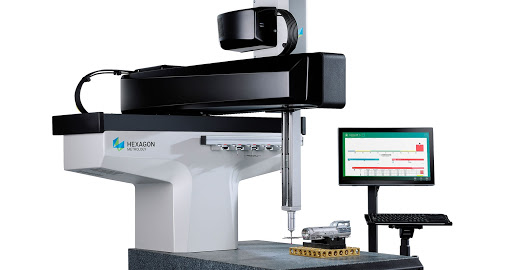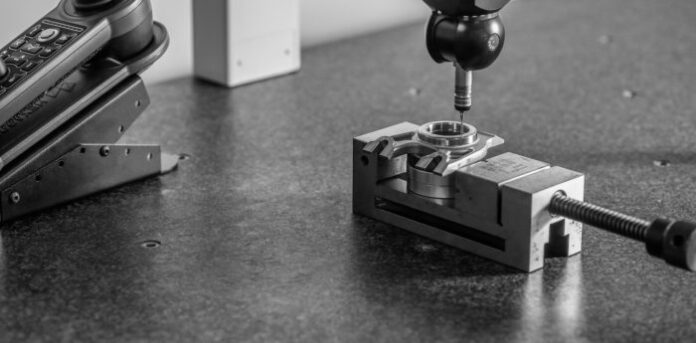Like factories across North America, you may be considering investing in technology which helps boost production and cut costs without causing any corresponding reduction in quality. It may sound too good to be true, but coordinate measuring machines (CMMs) have already performed this function for Canadian and American companies for years.
In the latter part of the 20th century, North America’s manufacturing industry was threatened by globalization. Increasing automation in aspects like quality control on production lines was a major reason why factories here could compete against rivals which had fewer regulations to contend with and much cheaper labour costs.
The CMM machine you buy has a direct impact on the quality and the quantity of your output — which means it has a direct influence on your company’s bottom line. This is clearly not a decision you want to take lightly.
Whether you’re looking to buy a brand new or used CMM machine, a retrofit, or an upgrade, your decision will be based on answering many little questions. However, before you dive into those, start with these three high-level questions.
1. Are You Replacing an Existing CMM, or Is This Your First?

If this is a replacement or an upgrade, your past CMM experience will give you very specific questions that need to be answered. You know exactly what you will need from your new machine, based on what the old machine did well and where it may have let you down.
If it’s your first time buying CMM equipment, talk to industry leaders like Cmmxyz.com that have worked around this equipment for decades about what kind of CMM machines best suit your needs. There are different kinds of CMM machines available on the market, and the software inside also ranges immensely.
If this is your factory’s first CMM machine or you’re building a facility from the ground up, your needs may be more open-ended. This equipment is designed to boost production by automating things like quality control, so aligning this equipment with the specific on-the-ground conditions of your factory ensures best results.
2. Is Buying Used an Option?

If you look at used CMM equipment, you could gain as much as a 50% (or more) cost reduction. This is obviously a huge selling point for a lot of companies, since the machinery itself is only there to increase revenue by reducing production costs.
But we would never advise you to let cost be your sole decision-maker. Especially given that this machinery exists primarily to automate quality control, it must itself meet or exceed the threshold in quality that the industry expects.
Thankfully, there are reliable sellers of used CMM equipment that also specialize in doing repairs and sourcing old parts. Look for a company that has sold metrology equipment for decades.
Metrology is a complex industry and the machinery that drives it is sophisticated. The authorized dealer needs to be trustworthy and experienced, and they should have a huge range of CMM machines available on the premises.
Whether you need a Portable CMM, Bridge CMM, Gantry CMM, a Vision and Multisensor System, or something else, expect the dealer to have many options available. Your factory will have specific needs depending on the nature of the product it produces, and there should be a wide selection of used equipment available for purchase that can fulfill these needs.
Another benefit of buying used equipment is how quickly you can get it. A new CMM machine can come with a 6-8 week waiting period for delivery. However, with a used unit, you can get it as soon as possible. If turnaround time is a big factor for your company, this could impact your decision — after all, time is money.
3. Where are You Buying Used From?

If you do decide to get a used CMM machine, where will you get it? Clearly, not all used CMMs are created equal, nor are the sellers of this machinery.
Sometimes used CMM equipment is in better shape than others, and you need a trained professional to assess and vouch for the quality of what you’re about to buy. Only trust a seller of used CMM machines if they run a thorough inspection of all the parts, including:
- Probing systems
- Airlines
- Bearings
- Cabling
- Drive systems
For this reason, buying a CMM machine from the auction or from an independent seller is risky. Caveat emptor, as they say
Companies looking at used equipment are much better off going through a seller authorized by the Machinery Dealers National Association (MDNA). That way, companies receive important guarantees that are impossible to secure when purchasing through individual sellers or from the auction.
With MDNA dealers, you have the peace-of-mind of knowing that they stand behind what they sell, and that they will refund any mechanically unsatisfactory machinery or repair it. Essentially, when you buy a used CMM machine from an authorized dealer, you can get top-grade equipment at rock bottom prices while still getting the warranties and assurances that come with buying new machinery.
Buying from an experienced and authorized dealer also means you can have your used CMM machine installed professionally, so it’s calibrated properly from the instant it reaches your factory. These machines need to work to specification, and installing it without controlling for variables, even such as room temperature, can affect performance.
Purchasing equipment that you’ll rely on for years is obviously a massive decision with major repercussions down the road. You can save a lot of money by buying used, while still getting equipment that meets or exceeds the high standards of industry.
CMM machines have already been an invaluable resource, helping to make manufacturing in North America and beyond competitive again at a time when it faced new threats from the forces unleashed by globalization.
But you must make sure not to sacrifice reliability for affordability. Go with a new machine from a trusted seller, or purchase a used machine from an MDNA authorized dealer. That way, you will be confident you’re getting top quality machinery that will deliver peak performance for years.









